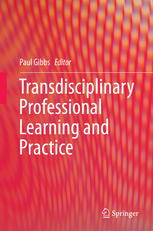

Most ebook files are in PDF format, so you can easily read them using various software such as Foxit Reader or directly on the Google Chrome browser.
Some ebook files are released by publishers in other formats such as .awz, .mobi, .epub, .fb2, etc. You may need to install specific software to read these formats on mobile/PC, such as Calibre.
Please read the tutorial at this link: https://ebookbell.com/faq
We offer FREE conversion to the popular formats you request; however, this may take some time. Therefore, right after payment, please email us, and we will try to provide the service as quickly as possible.
For some exceptional file formats or broken links (if any), please refrain from opening any disputes. Instead, email us first, and we will try to assist within a maximum of 6 hours.
EbookBell Team

4.7
26 reviewsThis book presents thinking about and through transdisciplinary and professional development as an educative process. Rather than focusing on the delineation of the approaches offered, an analysis of these contributions points to commonality in those problems that benefit from a transdisciplinary perspective. The core elements of transdisciplinarity can lead to what might be called metanoia - another way of knowing; a knowing which is ‘beyond that which is creative and transformative. This poses challenges for the practice of all professionals and is the core issue that this book addresses. The book brings together the constituting views of transdisciplinarity, or metanoia, and focus them on current professional practice. The book is structured in two parts and five sections. The first part deals with key issues in Transdisciplinarity; its actuality and how it creates knowledge. Section 1 has three original papers which look at Transdisciplinarity from a different lens. Especially, the Islamic voice has not been heard in this context before. Section 2 considers the knowledge aspect of Transdisciplinarity and how this might be confronted with existing disciplinary knowledge. Part 2 of the book is directly focused on professionals and their education. The third section considers research pedagogy and graduate education for the professional. This is followed in section 4 which offers a discussion on team work. In the final section six chapters present the transdisciplinary practitioner in different contexts.